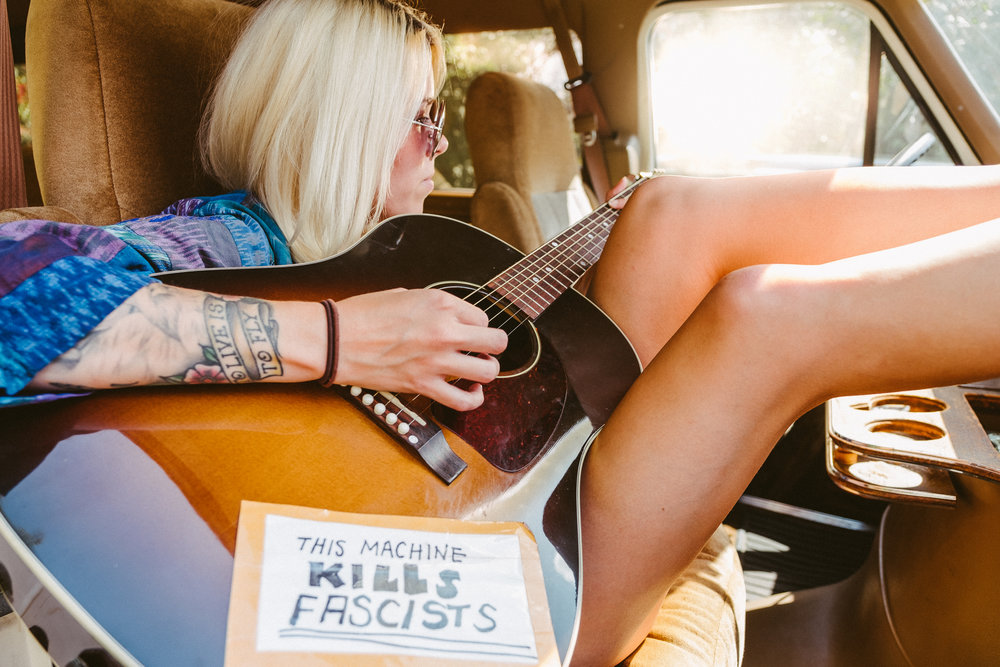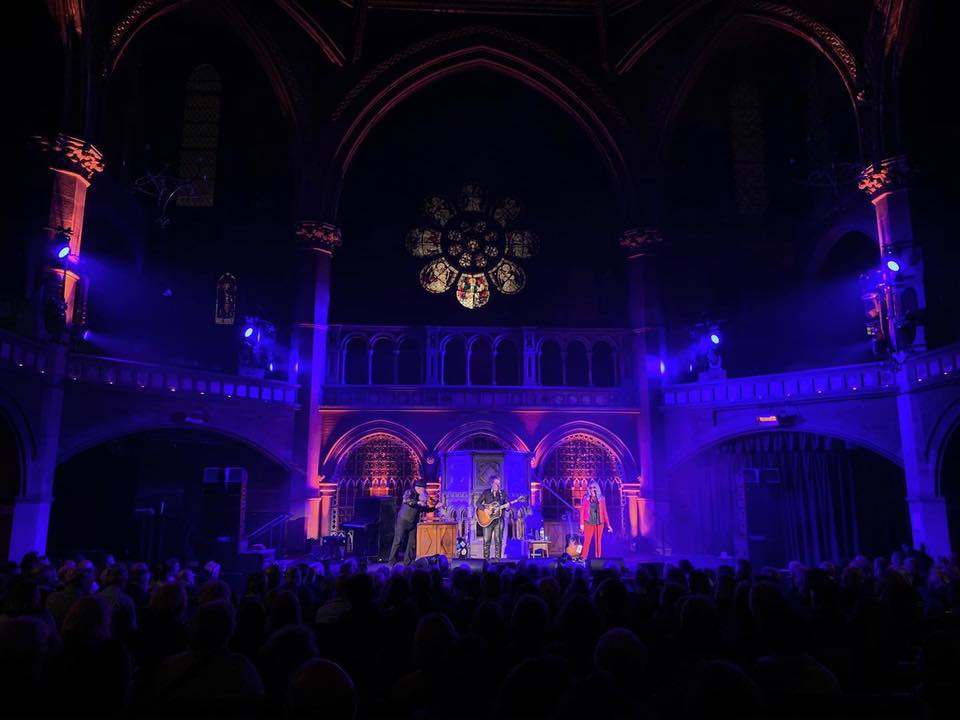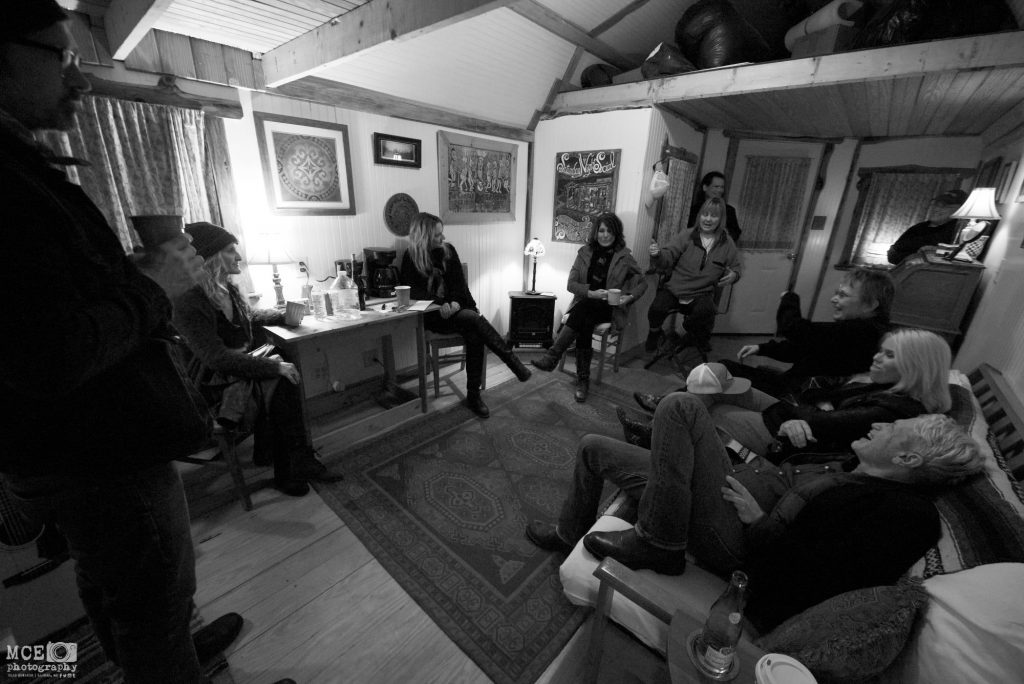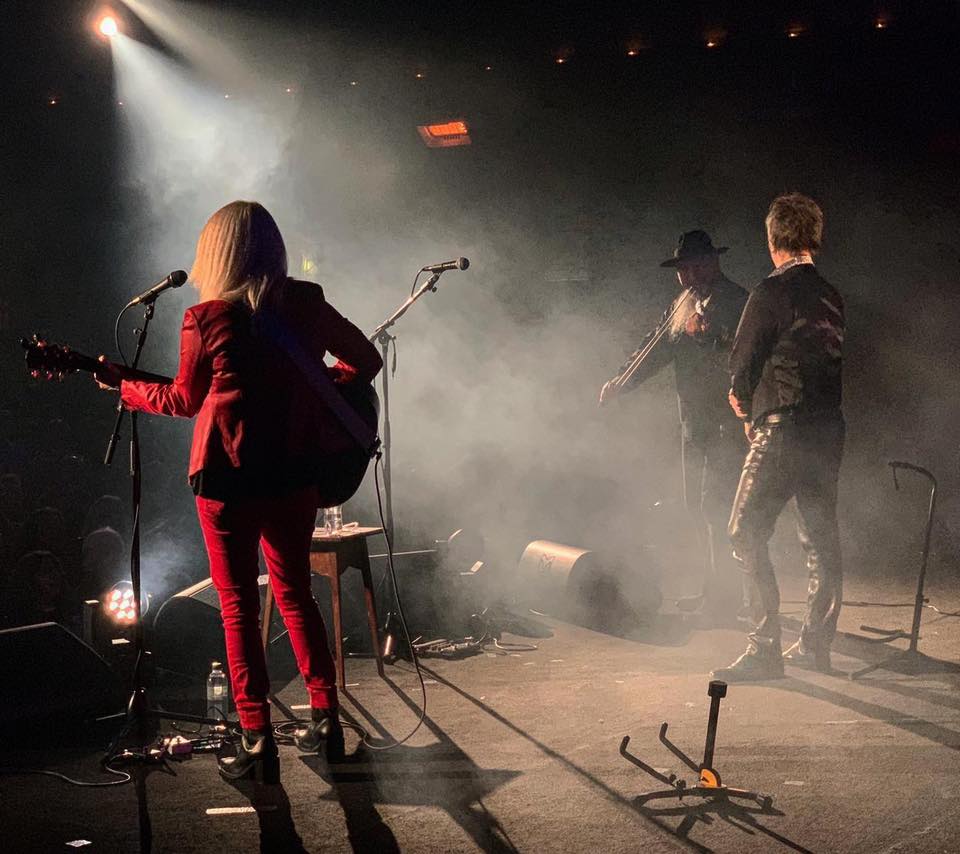Jaimee Harris: Strong, Badass, & Vulnerable

Austin’s Jaimee Harris has the sort of voice that reaches into your heart and makes you feel less alone, more connected, and somehow seen. In the tradition of Leonard Cohen, Johnette Napolitano, Patti Smith, Nick Cave, and Emmylou Harris, her rich tones and emotive delivery are as perfect for big wide open sky road trips out to the country as they are for introspective rainy days spent mulling over your tea and your dreams. Strong, badass, and yet vulnerable – I’ve been finding her new album “Red Rescue” and specifically the tune ‘Depressive State’ an absolute inspiration and salvation as we enter the new year.
So it was both a delight and a wonder when I got the opportunity to interview her for Country Queer right as she was embarking on an international tour with queer country powerhouse Mary Gauthier. Here is what she had to say:
Cindy Emch: So good to talk to you – how’s it going?
Jaimee Harris: Everything’s great! Thanks for having me!
CE: I hear you’re heading out on the road to Italy soon – have you played there before? What are you looking forward to most about your European tour?
JH: Last year, Italy was my first stamp on my passport. We spent two weeks eating and folking our way through northern Italy! It’s kind of a trip walking into folk clubs there and seeing pictures of Townes Van Zandt and Peter Case. I always love connecting with new fans in Europe and the UK. Being from Texas, I LOVE to talk about Texas songwriters: Townes, Guy, Butch, Joe, Jimmie, Terry… I’m still a super fan. I think I click in with fans because we like to nerd out over songwriters and there seems to be a certain affection for Texas songwriters in particular. I’ve been known to hang out at the merch table for hours talking to folks or heading out to afterparties to play songs around a campfire until dawn. Growing up in Waco, Texas — I didn’t have access to a lot of the music I was interested in because there was no independent record store in town. I think I identify with people in Europe and the UK who feel so drawn to this genre of music, but may not have a massive community to share that obsession with regularly.

CE: Aaron Lee Tasjan told our publisher Dale that we absolutely HAD to talk to you about being a queer country musician – how has being queer and doing country music impacted your career or your art as a musician?
JH: First of all, I’d just like to say on the record that I believe Aaron Lee Tasjan is one of the most creative, trail blazin’, badass songwritin’, electrifyin’, encouragin’, community buildin’ artists in the world. I am a FAN.
Honestly, I’m not sure how much being a queer country-folk singer has impacted my career. I’ve never been in the closet, per se, but I’ve never been super public about the majority of my romantic relationships. My goal as a songwriter is to deeply connect with anyone who is listening. Often my style is to sing in first person in a “me to you” dialogue. For that reason, gender hasn’t made its way into many of my songs until recently. When I fell in love with Mary, that changed. I’ve written many songs directly to her, for her, about her, about us, about longing for her when we were long distance. I now understand that phrase “when you know, you know” and it’s making its way into my writing.
I do, however, definitely feel being a woman has had a serious impact on my career. If you’ve been paying attention, you know that I’m definitely not alone in this battle. We have to fight a hundred times harder to be taken seriously. It’s been my experience that I have to know more than the average straight male musician about every single aspect of my career so I can defend myself. For example, I encounter many sound men who feel the need to explain my own gear to me. Or to tell me I don’t need the things I’m asking for in my monitor. I’ve often had experiences where I ask for “less mids,” and the sound guy will fire back with “what specific frequency?” So, I have to know the frequencies.
I actually didn’t have a full understanding that I was a woman or what it meant to be perceived as a woman until the morning after the 2016 election. I have a lot of traditional male qualities internally, but externally appear very femme. On the morning after the 2016 election, I became hyper aware of the limitations put on me and the dangers of just living day to day as a woman. I’ve since been educated by veteran female songwriters on their struggles dealing with the business and their male peers. It’s been an eye opening education that I’m still being schooled in every day, especially as I turn up the dial on my own career.

I had a conversation with one of my favorite singer-songwriters / producers (Courtney Marie Andrews) recently that kind of screwed in the lightbulb for me. I have a really big voice that I’ve shied away from showcasing in my own songs. It’s probably one of the reasons I love singing background vocals so much because I get to paint with my voice in a way I historically haven’t written into my own songs. I’ve always been afraid of being labeled a “chick singer,” because I want my songs to be taken seriously. Courtney made a point that our heroes – Leonard, Townes, Bob – didn’t showcase their voices like that, so we didn’t either early on in our writing. She encouraged me to experiment with my voice more in my new writing and I’ve been following that path. I do think for the most part, a man can sing his ass off and* still* be taken seriously as a songwriter. I’m angry with myself that I’ve held back that part of me for so long. That was a limitation I put on myself by letting the patriarchy sink into my skin.
CE: Queer country as a movement seems to be picking up steam every day – how do you see that impacting the industry?
JH: Well, I’m probably not deep enough in the industry enough to make an extremely educated comment. But, I do think Brandi Carlile selling out Madison Square Garden, Orville Peck features on magazine covers, and Lil Nas X’s GRAMMY nominations can only help move the conversation forward. AND I AM HERE FOR IT.
CE: You were a protege of Mary Gauthier – wow, what a mentor to have! – how did that connection happen and what was it like?
JH: Connecting with Mary has been truly one of the greatest blessings in my life. I’m a HUGE fan of Eliza Gilkyson and Gretchen Peters. In fact, there was a time in my life when I forced everyone that came to my house to watch Eliza’s ACL taping. A lot of my friends and fans were hyper aware of my borderline obsession with Eliza’s songs. I’d begun covering some of her songs at a residency I had in Austin for a year. I’d practice singing harmony to every song on every one of her records in my car just in case I ever got the opportunity to sing with her one day! A lot of my friends were subjected to these road rehearsals in my CRV. I’d also cover Gretchen’s songs at a weekly Gospel Brunch I’d play to raise money for the Capital Area Food Bank. I came to Mary’s music only a few years ago via a Ray Wylie Hubbard song called “Name Droppin’” I was aware of every name he mentioned in the song, except for Mary. A quick Google search led me to her incredible body of work.

In early 2017, my mentor Jimmy LaFave, was nearing the end of his life after a devastating cancer diagnosis. I learned that Gretchen, Eliza, and Mary were teaching a workshop outside of Austin, but I couldn’t afford it and my schedule didn’t allow for me to attend the workshop. So, as a surprise birthday gift, a group of fans and friends raised the money for me to attend their workshop in Taos, NM that July. All three were close friends with Jimmy and knew he was mentoring me in the way he helped Slaid Cleaves, John Fullbright, BettySoo, and so many others.
On the second day of the workshop, Mary gave a prompt based on the Emma Lazarus poem written on the Statue of Liberty. What resulted was a song called “On the Surface,” which is ultimately a look at the concepts of worthiness and equality in our society. How do we treat recovering addicts? People trapped in the criminal justice system? Refugees? Immigrants?
While I was writing the song, Mary happened to enter the small room in which I was writing. Somehow, that led to a discussion between us where I told her my deep desire is to write with incarcerated persons and play in prisons. She shared with me that she had been writing with veterans for five years and would release a record of those songs in the following year. As she stood up to leave, she stopped at door, turned to me, and said “I know how Jimmy was helping you. I know this loss must be devastating to you for so many reasons. I’m not sure if I’m the right person to step in, but if there’s ever anything I can do to help you, please reach out.” After that, she’d sporadically call me (every other month or so) to check on the progress of my debut record and career. One time (on Townes Van Zandt’s birthday) she called me, but I had to hang up abruptly. When I asked if we could pick up the conversation the next day, she told me she was going on the road for a few weeks and she’d call me when she could. I still can’t explain why, as she was 100% professional every time we spoke, but when we hung up my heart sunk. I realized, for some reason, I didn’t want to wait three weeks to talk to her again. I guess that reason was I was in love with her! We’ve been a couple since April 2018.
CE: That’s a pretty amazing love story. Forgive me while I swoon over here for a moment. So… when you’re getting ready to work on songwriting – do you have a favorite method or ritual that helps you with the creation process?
JH: Lots and lots and lots of coffee! Seriously, though — I’ve discovered that the verse that normally gets me into the song typically isn’t the first verse. Often it ends up being the second or third verse. So, when I’m writing I write out lyrics on long, lined sticky notes. That way I can physically move ideas around on my wall. Sometimes I find that lyrics that don’t end up in one song make their way into another or at least serve as a lily pad to hop to for another, better idea. In the editing process, I drive around for a while, or go play pinball with earbuds in, to absorb the song. That helps me make sure the melody is lifting in the correct places and the right words are getting the vocal mojo.

CE: Who are some of your biggest musical influences?
JH: Emmylou Harris is the reason I got a guitar for Christmas when I was five. I asked my parents for a pegasus and I would not back down. I had to have a flying horse. At the same time, I was listening to “Light of the Stable” on repeat for months. That’s when they noticed I was interested in music and probably would enjoy having a guitar for Christmas. She continues to be one of my greatest teachers.
Fleetwood Mac was the band that really made me want to play music professionally. Patty Griffin made me want to be a songwriter. I’ve been in love with Kasey Chambers’s music for a long time. I love that she plays with her dad, too. I started out playing with my dad, who is also one of my biggest musical influences. Others include Tom Petty, James McMurtry, Buddy & Julie Miller, Woody Guthrie, Mavis Staples, K’s Choice, Tracy Chapman (her debut record), Kelly Willis, Butch Hancock, Jimmy LaFave, Peter Case, Townes Van Zandt (if you haven’t picked up on that already), Mindy Smith, Eliza Gilkyson (listening to her taught me how to OWN my low range — especially as a harmony singer), Leonard Cohen, Nick Cave, Bonnie Raitt, Lucinda Williams, Jon Dee Graham, Kathleen Edwards, Texas Tornados, and Jackson Browne. Also, lately I’ve been on a MASSIVE Linda Ronstadt kick. I’m learning everything I can from her by diving into her music again.
CE: There are so many genres, sub-genres, and new genres for country music happening all of the time – I once had a band of mine described as hillbilly goth grass! – how would you describe your sound to our readers?
JH: Folk’n’roll
CE: I love that! You grew up in Waco and currently make your home in Austin – how do you think being from Texas has influenced your music?
JH: I lived in Austin for ten years, but recently moved to Nashville. I’ve been thinking about Texas a lot. I think growing up in a religious, semi-small town certainly has influenced my writing. You have to learn how to make your own fun in a small town. It helps to have a big imagination. Having different opinions or a different lifestyle than the “norm,” taught me how to stand my ground while also getting along with others in my community. Songs have served as being a safe place for me to express my feelings — about anything! Love (historically, mostly unrequited), the criminal justice system, depression, politics, addiction. Living in Austin granted me the opportunity to learn up close from a lot of my heroes. I stood by the stage at the Continental Club almost every Wednesday learning as much as I can from masters Jon Dee Graham and James McMurtry. I saw Ian McLagan play many times. I’ve learned master harmony skills from Mark Hallman and Gurf Morlix in their studios. I’ve seen Flaco Jiminez play in road side dives. I’ve seen Willie Nelson play almost every 4th of July since I was eighteen. I’ve heard some of the best songs ever written sung by Butch Hancock in a ghost town on the border. Johnny Nicholas taught me more than I ever would have learned on my own about the blues. There are so many talented writers and performers in Texas. You can see most of them for $8 at The Continental Club on a weekday. They’re also incredibly generous with sharing their knowledge. All of that listening has helped me to become a better songwriter.
I also believe that the landscape of Texas is inspiring. So many of my songs have begun on long drives, late at night, traveling on Texas highways and back roads. Since I’ve left Texas, I’ve found myself writing specifically about those highways, the Terlingua sky, and the magic embedded in Texas soil. Most of my songs are birthed from some kind of longing. I’ve longed for love, acceptance, redemption, and equality. Now, I’m wrestling with the longing for my Texas home in my songs.
CE: Who are some of your favorite current artists making country music today?
JH: BettySoo, Bonnie Whitmore, Michael O’Connor, Adam Carroll, Caroline Spence, John Prine, Gurf Morlix, Kim Richey, John Moreland, Nick Nace, Samantha Crain, John Fullbright, Nellie Clay, Emily Gimble, Ali Holder, and Jared Tyler. Other non-country favorites include Brian Wright, Shinyribs, Jane Ellen Bryant, SEELA, Western Youth, Chris Stamey, Ray Bonneville, Josh O’Keefe, and Wes Collins. Also, HAVE YOU HEARD THE NEW BUDDY & JULIE RECORD? IT RULES.
CE: Wow – you know I’m about to follow every one of those artists to just devour the good music! So – second to last question – what’s on your musical bucket list?
JH: I’ve been fortunate that a lot of my musical dreams have already come true. Like, sharing a stage with Emmylou Harris. I just hope I continue to write songs that connect with people so I can follow this crazy thing down as far as it wants to take me.
CE: Anything else our readers should know?
JH: After the second time I got out of jail, the State of Texas wanted to send me to rehab. Miraculously, I had insurance at the time. At sixty days sober, my insurance said I was too sober to go to rehab. I couldn’t afford the $800 / month cost of going to rehab. At 75 days sober, the state suggested I start drinking again to reset my sobriety date so my insurance would cover rehab. I found another path that the state agreed was acceptable. Had I not, and followed the state’s suggestion, I likely would have died. I think not everyone is aware of how easy it can be to remain trapped in the criminal justice system. I feel incredibly fortunate that it only took me four years to get out of it. Everything got better after I got sober, including my songs. There’s an organization in Austin called The SIMS Foundation. They help Austin musicians (as well as roadies and sound personnel) get access to affordable mental health and addiction-recovery services. The SIMS Foundation helped me get into life saving therapy during a time in my life when I was unable to afford it and struggling with suicidal ideation. I try to take any opportunity I can to shine a light on the life saving work they do in hopes of raising awareness for the organization. It’s also my dream that other music towns will create similar life saving programs for their local musicians.
You can find out more about Jaimee Harris and see when she is coming to your town at www.JaimeeHarris.com